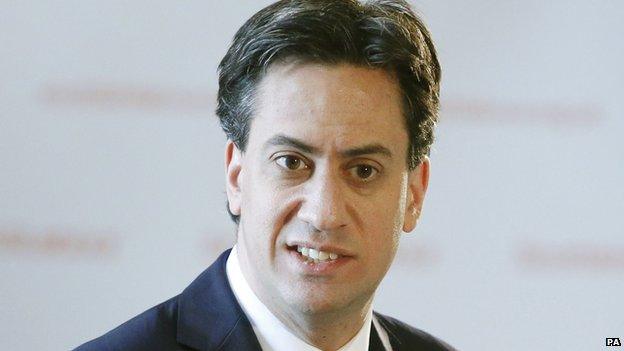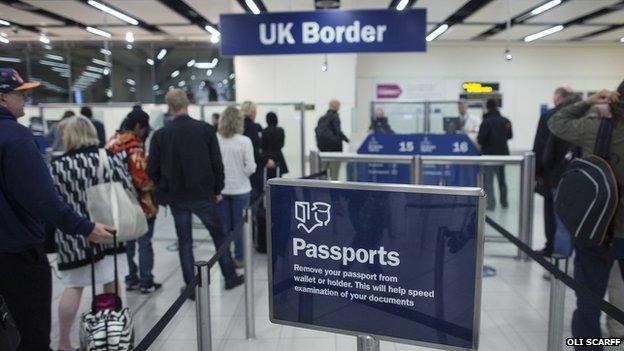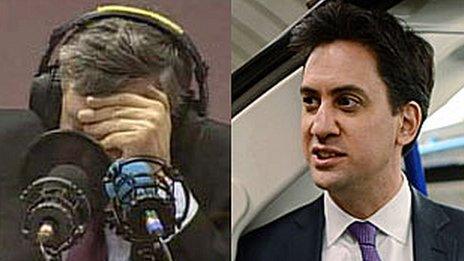Ed Miliband: Labour taking immigration issue seriously
- Published
- comments
Ed Miliband: "Labour will control immigration with fair rules"
Ed Miliband has said there can be "no doubting" how seriously Labour is taking immigration as an issue.
He spoke after setting out the second of the party's key election pledges, to "control immigration fairly".
Earlier, a leaked document obtained by the Daily Telegraph, external suggested Labour wanted its MPs to "move the conversation" away from immigration.
But Mr Miliband dismissed that as "not very well drafted language, out of context, in a briefing document".
Speaking in Great Yarmouth, the Labour leader set out plans to stop cheap foreign workers replacing British staff, saying a future Labour government would pass a law to criminalise such behaviour.
He promised a "sensible approach" to immigration controls, not "false promises or false solutions", and said Labour would "always respond to concerns (about immigration), not dismiss them".
"It isn't prejudiced to worry about immigration, it is understandable," he said.
His speech came a few hours after the Telegraph published details of the leaked Labour strategy document which advised MPs not to send out leaflets about immigration to all voters because it could prove to be "unhelpful".
Voters' concerns
They were also instructed to "move the conversation on" to other topics if voters expressed concerns about border controls.
The document, entitled Campaigning Against UKIP, says Labour campaigners should listen to the concerns of voters who are leaning towards UKIP.
It claims immigration is the issue "people most often cite" when explaining why they support Nigel Farage's party, which ran Labour close in October's Heywood and Middleton by-election in Lancashire and is targeting a number of Labour-held seats in May's general election.
"Volunteers and activists must understand and acknowledge electors' concerns about immigration on the doorstep, which will mean hearing opinions that may not gel with their own," it says.
The document highlights the changes in Labour's immigration policy since 2010 and says campaigners should "contextualise the problem as something that Labour has a clear plan to improve".

Mr Miliband says Labour will target rogue employers
But the document says Labour cannot win a "bidding war" with UKIP, adding: "It does not however follow that campaigning on immigration issues and emphasising our policies in our conversations with electors is always the correct response."
And it warns that Labour may lose votes the more "salient" immigration becomes as an election issue, because "as a political party, we are more effective at changing what is discussed and debated as opposed to changing what may be long-held and entrenched opinions of each party or views on which party has the best policies on each issue".
'Clear policy'
The document adds: "Our focus must instead be moving the conversation on to issues where we have clear policy which tackles the problems people are worried about, whether they express those concerns through the prism of immigration or not."
A Labour spokesman called the newspaper's story "nonsense" and added: "This is a 33-page document in which the Daily Telegraph is interested in taking only a few lines out of context."

Labour is facing a strong challenge from UKIP in some parts of the country
Shadow home secretary Yvette Cooper said she had not signed off on the briefing document, saying it was "wrong" and "doesn't reflect what we are actually doing".
She said the party's latest immigration proposals would "protect responsible employers who want to pay a fair wage".
But Labour backbencher Simon Danczuk said he was worried the party would appear "anti business" by focusing on employers, rather than the government, with its immigration measures.
The party has said immigration will be one of five commitments on its election "pledge card", which will promise fair rules on benefits, including requiring new EU migrants to wait two years before claiming welfare.
In his speech, the Labour leader put forward plans for a new law which would help stop firms exploiting legal loopholes to employ foreign workers on lower wages than their British counterparts.
Undercutting pay
In the past, Mr Miliband said he would close one such loophole which allows foreign agency workers to be legally paid less than the national minimum wage as well as increase fines for firms not paying the full wage.
The law would allow evidence to be used against firms which can be shown to have employed migrant staff on significantly different terms to local workers.
Low pay in the UK
236,000
paid less than minimum wage
11.3%
are migrant workers
-
65,000 cases of low pay investigated since 1999
-
200,000 staff owed an average £225 in back-pay
-
708 employers fined an average £1,000 in 2012/13
Mr Miliband said that the measure would stop such firms from undercutting the pay and conditions of low-paid British workers and also protect immigrants from being exploited.
"We are serving notice on employers who bring workers here under duress or on false terms and pay them significantly lower wages, with worse terms and conditions," he said.
"This new criminal offence will provide protection to everyone. It will help ensure that, when immigrants work here, they do not face exploitation themselves and rogue employers are stopped from undercutting the terms and conditions of everyone else."
Speaking on BBC Radio 4's The World at One, Caspar Glyn QC, chairman of the Industrial Law Society, said the proposed law would "rarely or perhaps never" be enforced because of the difficulties in proving an offence had been committed.
He believed it had been designed "to meet the UKIP threat and the Tory threat rather than actually being a useful piece of legislation".
UKIP leader Nigel Farage told BBC News that Mr Miliband's speech had been a "pathetic attempt" to persuade people Labour could "do something about the compression of wages in the United Kingdom".
He added: "The reality is, we can't."
Lib Dem leader Nick Clegg said: "It's no wonder the Labour Party doesn't want to talk about immigration, because they are the prime reason why confidence in the immigration system was so badly damaged."
The Home Office said it had inherited an immigration system "in disarray" and had introduced widespread reforms.
- Published14 December 2014

- Published11 July 2014
